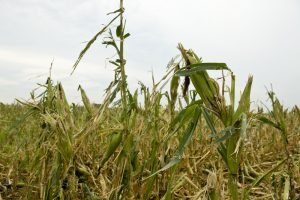
U.S. Rep. Martha McSally (R-AZ) led bipartisan opposition to a recent decision by U.S. Department of Agriculture (USDA) Secretary Sonny Perdue that decreases crop insurance protections for cattle ranchers and farmers in her home state and around the nation.
The USDA’s Risk Management Agency (RMA) on Sept. 17 reduced certain values used to determine the policy protection amounts in the Pasture, Rangeland, and Forage (PRF) crop insurance program, which helps protect producers from risks of forage loss due to low rainfall, according to McSally’s office.
The congresswoman said the reduced RMA county base values drop the Arizona average by nearly 41 percent, which means that her home-state ranchers are insured for less and would receive much smaller payouts.
In fact, Jay Whetten, president of the Arizona Cattlemen’s Association, said the 30 percent to 66 percent drop in the program’s protection “greatly reduced their ability to operate their ranches” during this year’s “severe drought.”
“The decision by USDA puts Arizona beef production at a tremendous risk,” said Whetten.
Such changes can’t happen, said Rep. McSally and 19 U.S. House members, who estimated that 32,000 ranchers could be put at “great financial risk,” according to the Sept. 18 letter they sent to Secretary Perdue.
“We write to request the reconsideration of drastic, sudden reductions in county base values used by the RMA to calculate policy protection amounts in the PRF crop insurance program,” the lawmakers wrote. “USDA’s justifications for the reductions – that they are necessary to ensure the policies’ actuarial soundness and reduce improper payments – are not furthered by the new new base values.”
Among the members who joined McSally in signing the bipartisan letter were U.S. Reps. Tom Rooney (R-FL), Andy Barr (R-KY), and Tom O’Halleran (D-AZ).
“Cattle ranching is an extremely important part of Arizona agriculture and contributes to our state’s economy immensely,” the congresswoman said in a separate Sept. 19 statement.
She pointed out that RMA last month told industry stakeholders that the PRF insurance wouldn’t be changed, “but went on to change their mind without providing adequate notice.”
“This eleventh-hour move harms Arizona’s ranchers and is unacceptable,” said Rep. McSally. “The tens of thousands of local farmers who rely on this program deserve much better, and I will continue to have their backs every step of the way.”
The lawmakers also brought up the issue in their letter to the secretary, noting that policyholders say the changes harm their 2019 crop plans, which are based on RMA’s previous assurances that no major changes would be made to the program.
“While government agencies need not disclose their policies to stakeholders before they are officially announced, misleading statements are another matter entirely,” the House members wrote. “The failure to notify affected producers … is an unacceptable way for the government to interact with the public.”
The lawmakers called on Perdue to take these concerns into account before RMA implements the reduced county base values for the 2019 crop season.
“Rather than implementing these significant changes on such short notice, maintaining 2018 levels for the coming year while conducting a thorough and inclusive deliberative process to determine county base values for Crop Year 2020 would be appropriate,” they wrote.
Lanny Hair, executive vice president of the Independent Insurance Agents and Brokers of Arizona, said members “sincerely appreciate Congresswoman McSally’s advocacy for Arizona farmers and ranchers” regarding the RMA decision.
“Agriculture including both farming and ranching is a critical component of the Arizona economy and insurance coverages are necessary for the operation of any business enterprise,” Hair said. “A sudden reduction in available coverage from the RMA will leave many who have relied on this program facing unnecessary financial exposure.”



